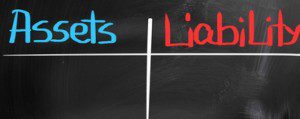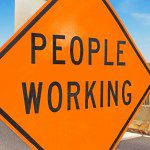What Do You Think?
What do you think, is living your faith at work an asset or a liability?
In this post I make the case that faith belongs on the asset side of our work ledger. In the next post, I’ll consider the liability dimensions of living your faith at work.
Value Adds From Living Your Faith At Work.
Value adds put faith in the asset side. They include the following:
- A Context For Work: Biblical faith that that is centered on Jesus provides a context for work. It places our lives and work within the grand arc of sacred history: God’s good creation, the spoiling of sin (the Fall) and God’s engagement to redeem broken humanity and creation back again. All work that is good, in one-way or another honors the creation/redemptive pattern (see these two posts for more: http://www.patheos.com/blogs/marketplacefaith/2015/08/the-why-behind-your-work/ AND http://www.patheos.com/blogs/marketplacefaith/2015/06/faith-and-work-location-tracking/
- The Value of Work. Work is a God given activity that has dignity. Human work is part of God’s provision for people and it is something that both workers and God take pleasure in. So in the biblical story work is not just a means to an end, not something to merely tolerate. All legitimate work is valuable to God and adds value to other people in some way.
- An Outside Source of Identity. Work is a fickle source of identity. But when Jesus taught his disciples to pray, “Our Father…” he demonstrated that faith establishes our identity first and foremost as God’s children. (We don’t deserve to be his children, but he seeks us and adopts us into his family irrespective of our lack of interest in him.) This means I am not what I do, I am defined instead by whose I am.
- An Outside Source of Standards. The boundaries for acceptable behavior are always shifting. But the teaching of Jesus and his followers provide us with a consistent portrait of ethical character. These ethics are built on the principles of love for God and others. The faith-filled worker ultimate answers to another voice, another set of standards. While this can cause tension at times, it also provides the relief of clarity.
- An Outside Source of Power. Resisting the temptation to engage in seemingly profitable yet questionable practices and resisting the temptation to turn a blind eye to the needs of others both take some sort of power. Jesus dictum is this: with humans, it’s impossible, but with God, all things are possible. He is not asking us to live a life at work that we can achieve through our own intension and effort. He is asking us to learn how to draw from his well of spiritual power. Jesus enables us to live the life he is calling us to live at work.
- The Relief That Comes From an Integrated Life. Maintaining a separate work persona and a faith persona bleeds a lot of energy from one’s life. Knowing that you’re aligned with God’s purpose for your life at work brings relief. Instead of managing multiple personalities, you graduate to a sense that your work-life is in God’s hands.
Caveat
Some readers may be concerned that the above list is a pragmatic pitch for faith. Should we have and live our faith whether it makes life easier or not, whether it “works” or not? My answer: of course! If it’s true, believe. If Jesus is real, trust him. The point of this post is to demonstrate that there are plenty of items in the asset column, benefits to living an integrated life. Not to suggest they are the reason we believe. When the faith one professes in Jesus on Sunday shapes the approach to life on Monday, the result is a net gain.
How is faith an asset for you on the job?
Picture: http://ronneb.com/wp-content/themes/striking/cache/images/1786_assets-vs-liabilities-new-meaning1-628×250.jpg













